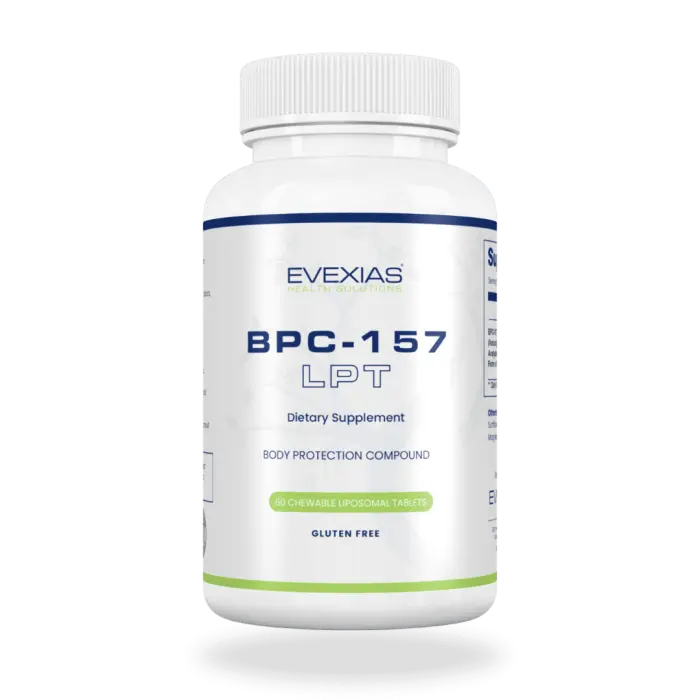What is Bpc-157?
BPC-157 (body protection compound), is an endogenous, stable pentadecapeptide – 15 amino acids – first derived from gastric juices. In laboratory studies, synthetic BPC-157 is reported to:
- Support the healing of wounds, and certain injuries
- Promote recovery after tissue traumas
- Limit the impact of systemic insults including hyperkalemia and hypermagnesia
Promisingly, few studies are reporting any adverse reactions to the administration of BPC 157. BPC-157 is known to be poorly bioavailable orally; however, through this effective liposomal tablet, bioavailability and efficacy a restored.
*These statements have not been evaluated by the Food and Drug Administration. This product is not intended to diagnose, treat, cure or prevent any disease.Copyright© 2023. All rights reserved. No part of this publication may be reproduced, stored in a retrieval system, or transmitted, in any form or by any means, electronic, mechanical, photocopying, recording, or otherwise, without prior written permission of the copyright owner.
Evexias- BPC-157 LPT Supplement
The Ingredients
Vitamin B1 (Thiamin)
Vitamin B1 is commonly known as thiamin or thiamine. This essential B vitamin is water-soluble and is known to support healthy metabolism, blood sugar levels and brain function. In addition to supporting proper eye health and the production of fatty acids, vitamin B1 also aids the body in the production of some hormones, including hormones that the body needs for stress response (insulin and glucagon) and blood sugar regulation (cortisol and adrenaline).
Vitamin B1 deficiencies are rare, but they can lead to a number of conditions and symptoms that include muscle loss, memory loss, loss of appetite, weight loss and an increased risk of cardiovascular disease.
Vitamin B2 (Riboflavin)
Like vitamin B1, vitamin B2 (riboflavin) plays a critical role in proper metabolic function. This essential vitamin also helps with the conversions of vitamin B6 into coenzymes and tryptophan into vitamin B3. Additionally, vitamin B2 assists the body in the breaking down of drugs, steroid hormones and fats.
Vitamin B2 deficiencies are also rare, but they can often occur in people who do not consume dairy or meat products. A vitamin B2 deficiency can also lead to a number of symptoms and conditions that include skin disorders, swelling in the throat and mouth, cracked and swollen lips, hair loss, red and itchy eyes and sores found in the corners of the mouth.
Vitamin B3 (Niacin)
Vitamin B3 (niacin) is essential to the body for a variety of cellular functions and processes that include metabolism, communication and DNA expression. This B vitamin also requires the assistance of vitamin B2 to be converted into a coenzyme that the body needs for the production of energy through metabolism of carbohydrates, fats and proteins.
Severe cases of vitamin B3 can cause pellagra, a condition marked by several negative symptoms that include memory loss, fatigue, vomiting, constipation, depression, rough patches of skin, diarrhea and discoloration on skin that has been exposed to the sun.
Vitamin B5 (Pantothenic Acid)
Vitamin B5 (pantothenic acid) is essential for the production of fats, coenzymes and proteins. In addition to being required throughout the body for energy production and metabolism, this essential vitamin is needed for the maintenance of healthy cholesterol levels.
Since vitamin B5 is found in so many different food sources, deficiencies usually only occur due to malnutrition. However, a deficiency of this essential B vitamin can lead to irritability, sleep issues, headaches and appetite loss.
Vitamin B6 (Pyridoxine)
Vitamin B6 (pyridoxine) is a catalyst for a variety of critical enzyme reactions throughout different parts of the body. This B vitamin has been recognized for its ability to support healthy cardiovascular function, amino acid metabolism, immune function, brain development and the metabolism of carbohydrates and fats.
A deficiency of vitamin B6 usually happens because of a vitamin B12 deficiency. Vitamin B6 deficiency can lead to depression, anemia, swollen tongue and decreased immune function.
Vitamin B7 (Biotin)
Like other B vitamins, vitamin B7 (biotin) plays a critical role in the metabolism of fats, carbohydrates and proteins. Vitamin B7 also supports proper DNA regulation and cellular communication.
A deficiency of vitamin B7 can lead to depression, thinning hair, fatigue and brittle nails.
Vitamin B9 (Folate or Folic Acid)
The body needs vitamin B9 (folate or folic acid) for red blood cell production. Additionally, vitamin B9 supports healthy cellular division, DNA replication and the metabolism of vitamins and amino acids.
A vitamin B9 deficiency can lead to heart palpitations, headaches and sores in the mouth or on the tongue, as well as changes to the skin, hair or nails.
Vitamin B12 (Cobalamin)
Vitamin B12 (cobalamin) has been recognized for its ability to support proper red blood cell production, DNA synthesis and metabolism of fats and proteins. This essential B vitamin is also well known to support healthy brain and neurological function.
A deficiency of vitamin B12 can occur in people who do not eat animal products. This type of deficiency can lead to memory loss, fatigue, weight loss, depression and appetite loss.



















